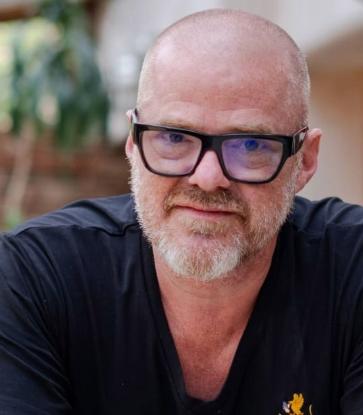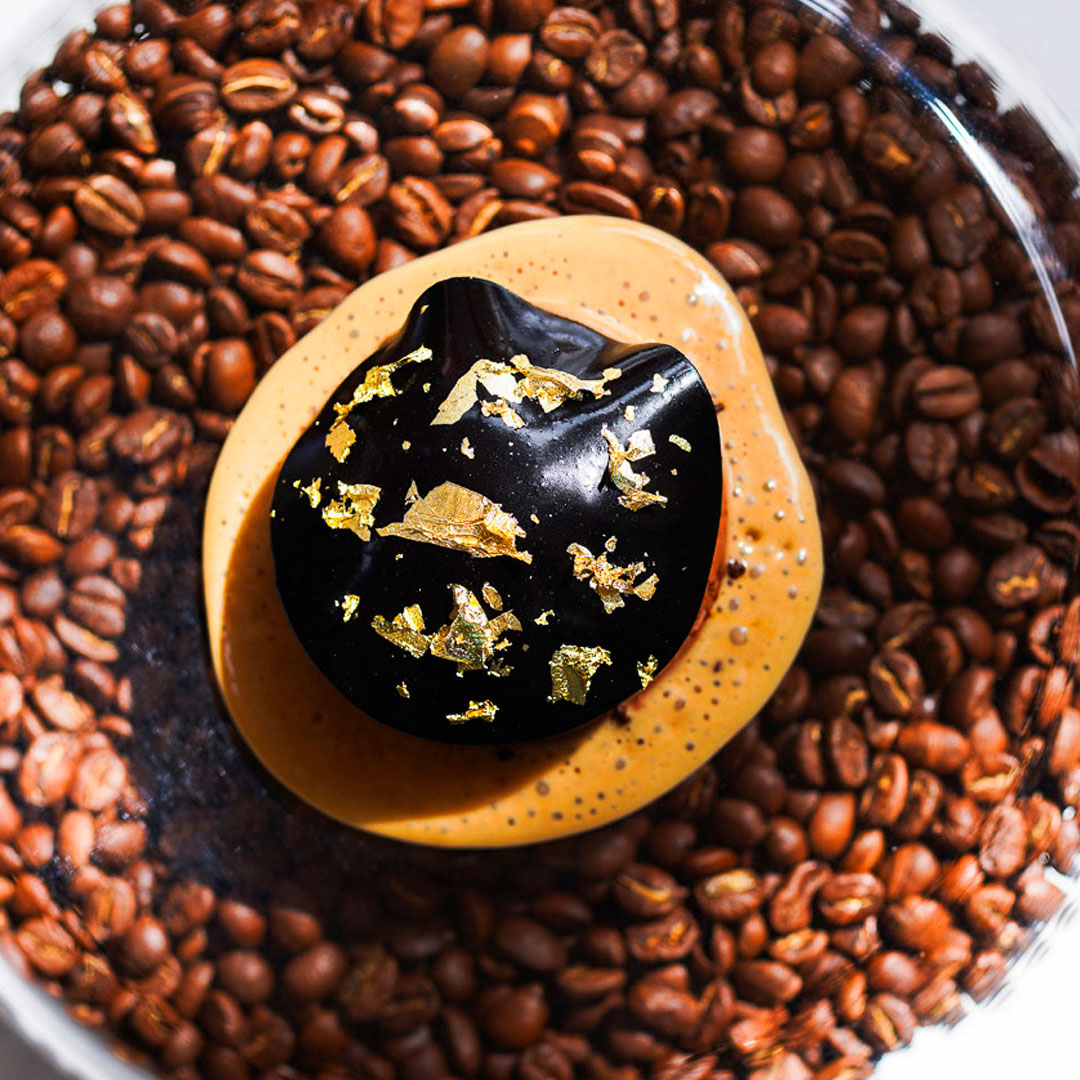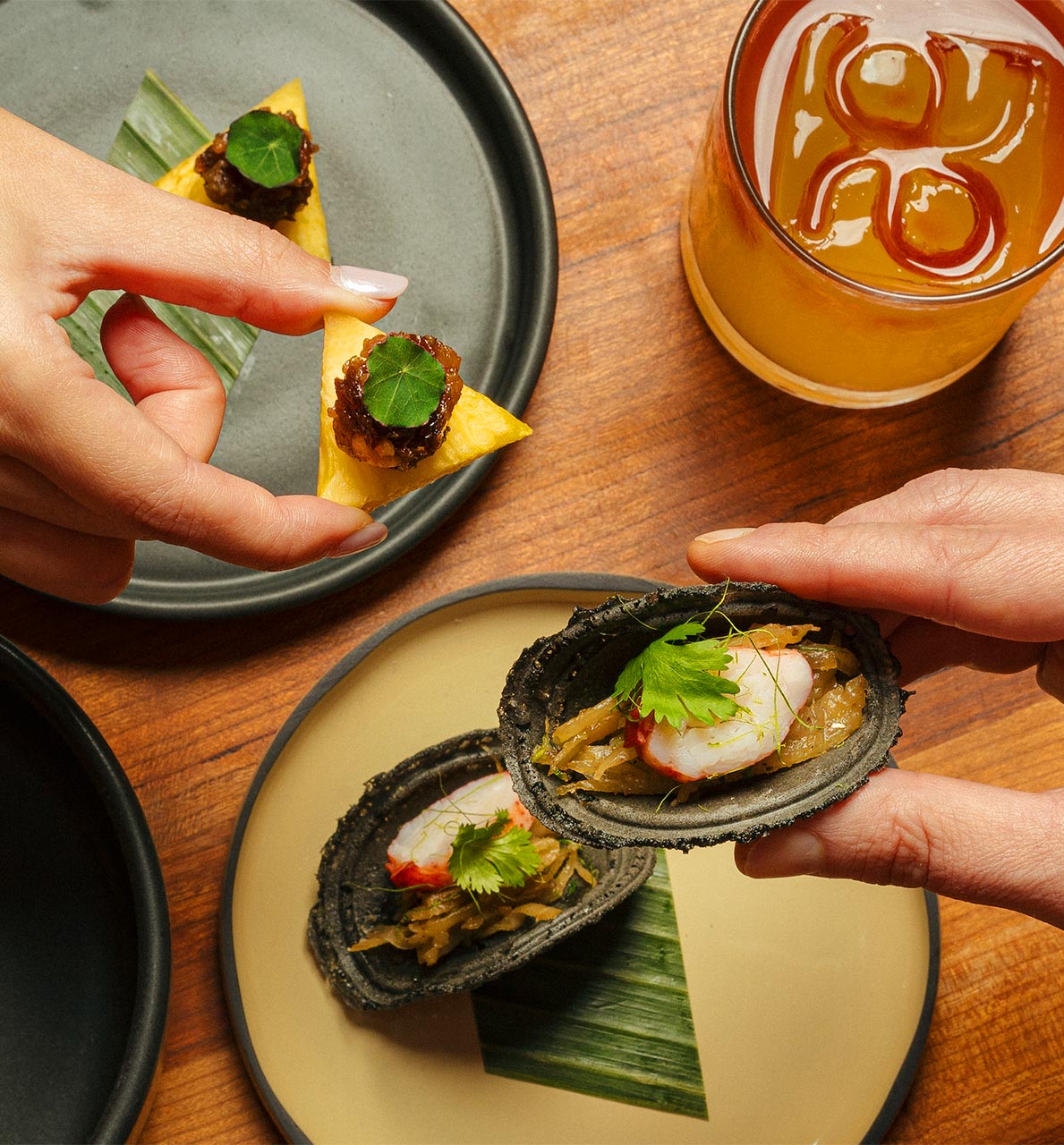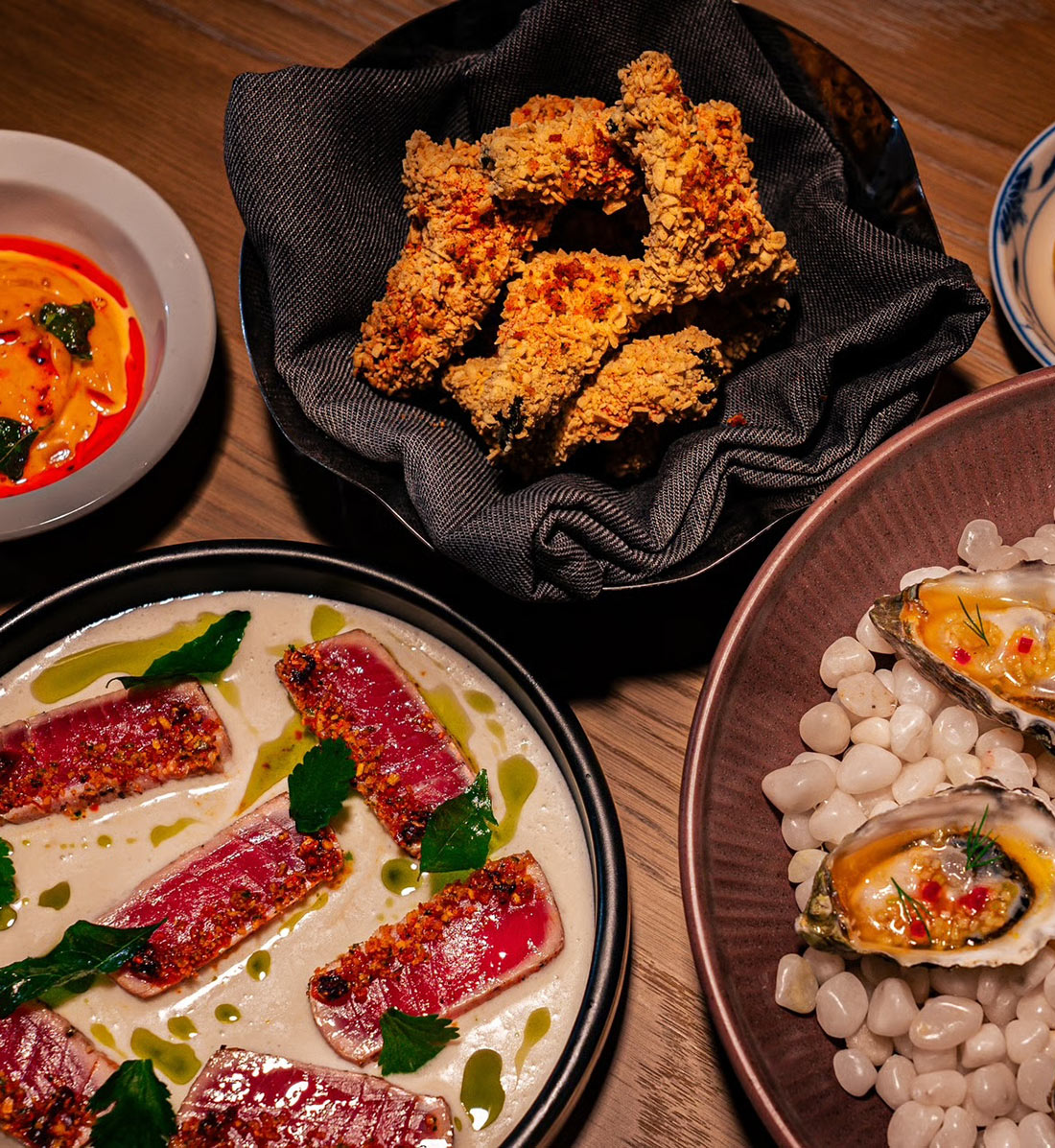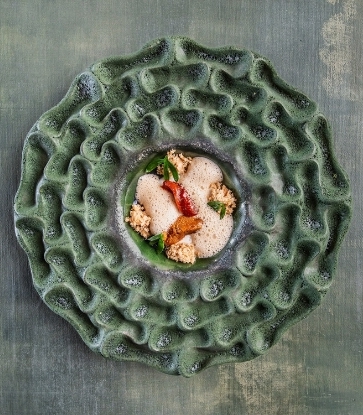One planned on becoming a fighter pilot; another considered a career in photography, and one spent four years in college before pivoting. Meet Emma Bengtsson of Two-Star Aquavit, Dominique Crenn of Three-Star Atelier Crenn, and Nancy Silverton, of One-Star and Green-Star Osteria Mozza. Their stories are all a little bit different, but they all have one thing in common: they’re trailblazing female chefs who have forged a Star-studded path, all while making room for the next generation.
WHY COOKING?
Nancy Silverton was drawn to cooking for a very simple reason. “I started cooking because of a cute guy in college,” she laughs. She fell hard—for cooking—and though she had already spent four years working toward a Bachelor’s degree, she dropped out. “My dad said, ‘I understand you want to follow your dream, but do me a favor and go to Le Cordon Bleu.’”
Dominique Crenn studied economics and international business and had set her sights on a career in photography. “I always loved food, but at that time, in Europe, the kitchen wasn’t really a place for a woman.” Then a visit to the United States changed her path. “I came to California in the 90s and fell in love with San Francisco.” She knew she wanted to stay. “I thought (cooking) was the way I could stay in the U.S.”
For Emma Bengtsson, cooking was where she was able to shine. “I’ve always been one of those kids who is always moving about and doing things, and I always knew that working in an office wasn’t for me. Somewhere along the line, we had these home cooking classes and I started realizing I wasn’t the worst in the class—I was the top. I always loved food and was blessed with a grandmother and mother who cooked, but it was at that moment that I started realizing I could turn this into a career.

STANDING OUT
Plenty has been said about the difficult conditions that many female chefs have endured in male-dominated kitchens but these three sought out places where they were able to stand out in a positive way.
Dominique Crenn joined Jeremiah Tower’s kitchen. “His was a very different restaurant. It was very different than the traditional French brigade—a little more human and loose.” She thrived in that space. “We’re still friends today and it’s been over 30 years.”
“I was very blessed because the first restaurant I ended up in treated everyone like a family member,” says Emma Bengtsson. It’s a philosophy she takes to heart. “If I ever walked into a kitchen that wasn’t the same, I’d walk out. It doesn’t have to be that way and that’s the advice I tell young chefs, that if you go into a kitchen where they don’t treat you with dignity and respect, walk out. A name on the resumé isn’t worth it.”
After culinary school, Nancy Silverton landed at Michael’s in Santa Monica. “Jonathan Waxman could not have been more inclusive and then I went to work for Wolfgang Puck to open Spago and he was that way too. I didn’t have that dysfunctional experience.”
Find the best restaurants and hotels around the globe with the MICHELIN Guide app.
Sign up, make a list of your favorites, and make a reservation with our booking partners Resy, OpenTable, and Seven Rooms.
ROLE MODELS
“If you were to have asked me who my most influential cooks would be, I could name ten people and they all happen to be women,” says Silverton. “Alice Waters and Judy Rogers, Joyce Goldstein and Mary Sue Milliken, Susan Feniger, and Suzanne Goin. The ratio (of female chefs) is not the same and not in balance but the people who were important in my life were all women. I had strong women in my family and grew up being taught by women that said you could do anything. I remember once at Spago, a journalist asked me, ‘what is it like to be a woman in the kitchen?’ I didn’t understand that question. I didn’t know that a woman’s place was not in the kitchen.”
“When I grew up I didn’t have a lot of female role models to look up to,” says Bengtsson. “There were maybe two or three and I would have never had a chance to meet or be encouraged by them. The world, the way it’s changing now, is giving us an opportunity to do that.”
“The first time I walked into the kitchen, I asked, ‘where are the women?’” says Crenn. Still, like Silverton, she felt lucky to be in San Francisco at a time where women were making inroads in the kitchen. “There are a lot of strong trailblazing women in the U.S.”

RUNNING THE SHOW
For Nancy Silverton, one business (La Brea Bakery) was born out of a need from another (La Campanile). “I needed good bread for my restaurant,” she says. She dove in and along the way found herself running a booming business. Though she later sold the bakery, it certainly wasn’t her last successful business. Now, Silverton oversees an empire that includes cookbooks and restaurants, including One Star Osteria Mozza. Her success is due in large part to her staying power, something she attributes to staying true to herself. “The places that I create – whether it’s the look, the feel, or the food, it’s all meant to be timeless. I’m not trying to be trendy and I never really understood what that word meant. It’s not part of my world or what I care about. I care about good food, craveable food that brings people into my restaurant. The type of environment I want to create is where people feel good about celebrating—whether it’s the evening or an event.
Emma Bengtsson was hand-picked for her role at Aquavit by a mentor who knew Aquavit’s Head Chef Marcus Jernmark. “He reached out to a mentor we both shared at school, and when he recommended me, I packed up my things and was here in New York within three months.” She was originally hired as the pastry chef but when Chef Jenmark left four years later, they looked to her to fill his shoes. “Having that job was not something I aspired to. I loved what I was doing as a pastry chef.” She agreed to take the position temporarily “if they promised to find someone else.” (Spoiler alert: They never did.)
“Part of me was afraid that I was going to fail,” explains Chef Bengtsson about why she didn’t want to take on the head chef role. She was also worried about expectations. “We worked so hard to get to the One Star, and that first six or seven months that was everything that was in my head.” Shortly afterwards, Aquavit was awarded Two Stars, a distinction it maintains, making Bengtsson the first Swedish female chef and second female in the United States to run a Two Star restaurant.
Chef Bengtsson chooses to harness that discomfort. “When it comes down to it, I think you need doubt and instability to push yourself beyond your boundaries. It makes you stronger because every day is a new challenge."
Dominique Crenn opened Atelier Crenn to share her story as a French woman with a strong connection to family and though it was awarded Three MICHELIN Stars—the first time for a female chef’s restaurant—she never rests on her laurels. “We closed Atelier Crenn to renovate and rethink (during Covid) to think about where I wanted to go. Now, it’s all about California—the history and the people. We have to think about what we can do today to make something different because food is movement. We have to move in a way to better things every day.”
CHANGING THE NARRATIVE
“It’s important to make sure that, as women, we are not a transaction,” says Crenn. “We have to stop that. The world needs to know that we are here and here to stay. People need to understand, but the way that you do that is not by being aggressive. I do things gently, and work hard to educate people and invite them to understand, to change the narrative.
This year I was the president of Bocuse d’Or and it was the first time they had a woman president. (As a self-taught chef) I don’t come from that world and am kind of an outsider and I was sitting in a room with a lot of men. What was beautiful was a lot of people came to me and shook my hand to say they were inspired by what I’m doing--and they were men! I’ve been given opportunities and I want to represent young cooks. I want people to be seen.”

FEMALE-CENTRIC CHALLENGES
“The women I talk to coming into the industry, are our own worst enemies in many ways,” says Bengtsson. “I have doubted myself through my entire life and when it all comes down to it, I think as women we doubt ourselves more. I once sat in a group talking to these amazing women—CEOS of major companies and made successes of their careers—and they all said that they doubt themselves every single day. That was so humbling to hear.”
Dominique Crenn believes confidence is key. “My dad used to tell me that this world is going to be very difficult and know that nobody is better than you. Never walk into a room with your head down. Know yourself and know who you are. Young women are hard on themselves. Don’t be hard, but work hard and understand that your weakness can become your strength.

HOW DO WE CHANGE FOR THE BETTER?
“We need to create a better ecosystem for the industry,” says Crenn. “You can be a woman and have Three MICHELIN Stars and not work 24 hours, 7 days a week if you create a system. The media needs to spotlight more people not just because they’re checking a box, but because they believe in it. When someone believes in something they are more inclined to bring their voice to it. Look at how many politicians are women. They are doing an amazing job.”
ADVICE FOR ASPIRING CHEFS
“You become a chef because you love people and telling stories and you want to tell the story of who you are to those who want to know,” says Crenn who recently kicked off a limited-run culinary collaboration with MILA Omakase in Miami. "That is why you become a chef. But get to know who you are as a person before becoming a chef because you also have to understand the world. The world is so beautiful with so many different cultures. Get to know art, read books, and get to know the world.”
“You have to love what you’re doing,” says Silverton. “It’s a lot of hard work. It’s not what you see on TV. You have to enter the business because you love hospitality and you have a passion and drive for the workings of a restaurant or kitchen.”
“I tell everyone to put your head down and work hard,” says Bengtsson. “Soak up everything. Every little thing. And don’t be scared to talk to your mentors and ask questions because there’s always someone who has gone through it. I give that advice to myself every day.”






